Resource
Composting Worm Bins
DIY Project
Some of the world’s hardest workers are some of the smallest. Vermicomposting (composting with worms) adds nutrients to the soil and keeps waste out of the landfill. Help your family or community be greener by making a vermicomposting bin.
Note About Volunteering at Home:
The impact of COVID-19 continues to change our daily lives and routines, but the volunteers that nonprofits rely on are more important than ever. The following project can be modified to do at home and delivered via mail or drop off to adhere to the social distancing guidelines set by local and national authorities.
We encourage you to connect with the nonprofits and NGOs in your area for the most impactful ways to donate and any specific safety guidelines they may have. To get started, you can check out your local Points of Light Global Network affiliate or Points of Light Service Enterprise, or search the web for local 501(c)(3) nonprofit organizations. Be sure to ask:
- “Would your facility be open to receiving this project I’m working on at home once it’s complete?”
- “Are there others way I can help?”
What You Need:
- Re-sealable plastic container that is relatively shallow and opaque
- Worms! Up to one pound per square foot of container space
- Hammer and nail for poking holes in plastic container
- Water, leaves, potting soil and shredded newspaper
- Kitchen scraps such as washed fruit and vegetable scraps, tea bags, coffee grounds and paper towels
Steps:
- Decide where your compost collection bin will go and how you will collect the worms. It takes from one to four months to make the compost.
- Call or email a local garden or farm and ask if they know where you can obtain worms and see if they would like your compost once it is done. You can also find places to order worms from online and start your own garden!
- Construct the worm bin with a re-sealable, opaque plastic bin and drill holes in the cover for air.
- Add the kitchen scraps, egg shells, paper towels, coffee grounds and tea bags.
- Add the worms and continue to add water until the compost is complete within one to four months.
Reflection Questions:
- How is composting helpful for the environment?
- What else can you do to reduce food waste and to benefit the environment?

